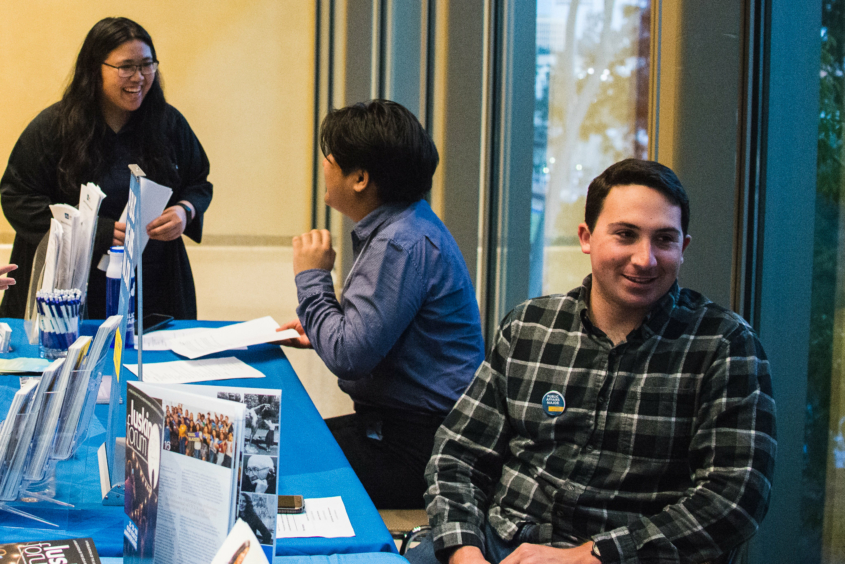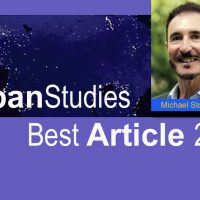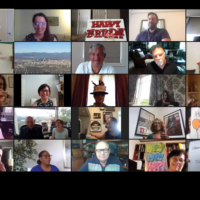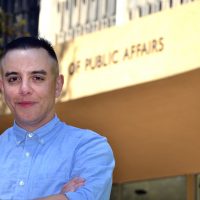
A Launchpad Into the Working World
By Mary Braswell
Candler Weinberg started his internship with the U.S. Forest Service in the fall of 2020, just as record-setting wildfires spreading across the West provided a grim illustration of the growing threat of climate change.
The position was a perfect fit for the public affairs major, a licensed EMT who aspires to enter the field of emergency management — and who has himself come face to face with natural disaster.
Weinberg’s family home was among hundreds destroyed during the 2017 wildfires in the Sonoma Valley winemaking region.
“It was just completely devastating,” said Weinberg, describing the fast-moving flames that overwhelmed fire department resources and the lack of planning that could have saved lives.
“It’s going to keep happening. And unless we learn from our mistakes and try to plan for the future, it’s just going to be this vicious cycle that never ends,” he said.
So Weinberg is taking full advantage of UCLA Luskin resources to build research, policy and planning skills to help other communities withstand disasters sparked by climate change.
His Forest Service internship is one step in that journey, made possible through his participation in the University of California’s Washington Center, or UCDC.
Over the summer and fall, a total of 17 public affairs majors and pre-majors took advantage of courses and internships through UCDC and its California-based counterpart, UC Sacramento, said Kevin Medina, who coordinates the Experiential Learning Capstone and other internship opportunities for the undergraduate program.
Learning by doing is a hallmark of the UCLA Luskin bachelor’s degree. The 72 members of this year’s inaugural graduating class will be the first to complete the yearlong senior capstone, which calls on students to immerse themselves in an organization, assess its needs and create a solution.
Amid the COVID-19 pandemic, almost all the internships will be conducted remotely, which creates both challenges and opportunities, Medina said.
As with any virtual connection, students may encounter technological difficulties and they will miss the in-office experience of working on a team. But one upside, Medina said, is that “the remote internships allowed us to think beyond a geographic restriction and paved the way for partnerships beyond the Los Angeles region.” He added that those without access to reliable transportation will be spared the added time and expense of commuting to a work site.
“The supervisors at our inaugural internship sites are dedicated to providing an intentional and high-quality experience where our public affairs majors can learn and contribute their knowledge,” Medina said. “Given this unprecedented time, our students are receiving the quality training they need to enter professional public service roles and graduate programs.”
Since transferring into the major in 2019, Weinberg has embraced the program’s hands-on opportunities. For his capstone experience, he will work with the Van Nuys office of Bob Hertzberg, majority leader of the California State Senate, while continuing his full-year Forest Service internship.
Last spring, he petitioned to conduct a research project for course credit under the direction of Professor Fernando Torres-Gil, head of the Luskin School’s Center for Policy Research on Aging. Weinberg reviewed case studies of fires, mudslides and other disasters and found an alarming lack of planning in place to meet the needs of the state’s senior population.
“Those policies are practically non-existent,” he discovered.
At another internship, Weinberg helped share the stories of those who fought in World War II and other U.S. conflicts. During the summer-long position with the Veterans Administration, he verified service records and tracked down family members to help collect and preserve the soldiers’ legacies.
And in his Forest Service internship, Weinberg is analyzing data on injuries to firefighters, law enforcement officers and visitors to help build a comprehensive emergency services plan to replace the patchwork of practices in federal forests and grasslands around the country. He’s also crafting congressional briefs on the importance of urban forestry, the green spaces that bring health and economic benefits to a community.
As an emergency medical technician, Weinberg has provided critical care on rural 911 routes and other locations, but he said he realized he could make a greater impact by helping shape disaster management policy.
When he discovered the Luskin School’s new public affairs major, “I realized that UCLA was going to be the best place for me as a research-heavy institution with a lot of academic freedom,” he said. “The breadth of professors and classes is really world-class and I think unmatched for an undergraduate program.”
At the Luskin School and beyond, Weinberg aspires to help overlooked communities create a sustainable living environment in the face of a warming climate.
“I’ve always been passionate about helping vulnerable populations,” he said. “That’s really what drew me to public health and then to policy, to be a voice for people who might not have much of a voice.”









Leave a Reply
Want to join the discussion?Feel free to contribute!